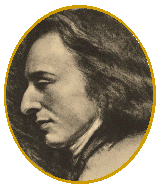

|


|
| FRÉDÉRIC FRANÇOIS CHOPIN Born: March 1?, 1810. Zelazowa Wola, Poland Died: October 17, 1849. Paris, France In his own words... "One needs only to study a certain positioning of the hand in relation to the keys to obtain with ease the most beautiful sounds, to know how to play long notes and short notes and to [attain] certain unlimited dexterity... A well formed technique, it seems to me, [is one] that can control and vary a beautiful sound quality."Polish composer of music for the piano. Chopin's music helped to expand the technical and expressive range of the piano. The music of Frédéric Chopin is, in many ways, a record of Chopin the pianist. All of his music is either for solo piano, or places the piano in an important role. As a performer, he was known for his improvisational ability, and his compositions are often the result of these performances. Chopin was born in Poland to a French émigré and a Polish woman of the court. He received his training at the newly instituted conservatory in Warsaw and he concertized in Vienna and Warsaw before going to Paris at the age of twenty. It was during this time of public performance that he wrote his large works, such as his two piano concertos. In Paris, he quickly became a part of the elite cultural circles and was championed by musical and literary figures alike. Most of his performances were in a more intimate atmosphere, and his music reflected this. Chopin carried on a long-term romantic affair with the writer George Sand (Aurore Dudevant), spending periods of great creativity at her estate in Nohant. Here, Chopin continued to associate with Europe's musical and literary elite. During this time he also established himself as a teacher, and many of his études were written as teaching pieces (though they certainly are artistic pieces in their own right). These years were also marked by deteriorating health. After his break with Sand in 1847, his condition worsened considerably. He died of tuberculosis two years later; his death was greeted with an outpouring of grief among Parisians. The wonder of Chopin's music is the way he conjured new sounds from the piano. His pieces explore the full expressive range of the instrument, and he had the ability to create (sometimes in just a few lines of music) a kind of musical poetry. The freedom with which he played is reflected in his extensive use of tempo rubato. He also extended the harmonic language of the Romantic style; not by bold leaps to new chords and tonalities, but by subtle side trips that take his pieces to those new tonal areas. Finally, Chopin is remembered as one of the first nationalist composers, using the themes and dances of his native Poland as the sources for his pieces (especially the polonaises and mazurkas). In every way, Chopin was the quintessential "Romantic" composer, and Robert Schumann's initial reaction to his music ("Hats off, gentlemen, a genius") was borne out in his short but spectacular career. Musical Examples: Works:
|
| Mozart | Beethoven | Chopin | Tchaikovsky |
|---|